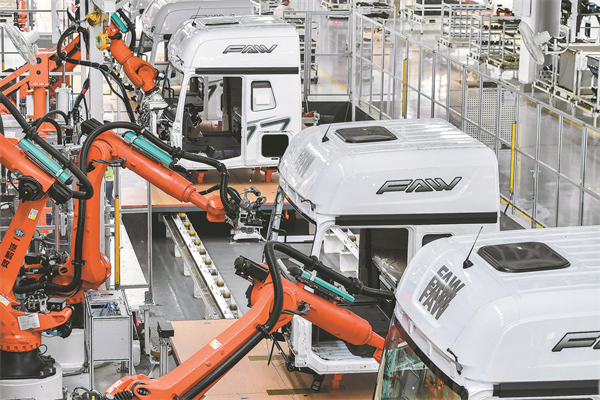
- Home
- Media Center
-
Events
- Wuzhen Summit
- Regional Forums
- Practice Cases of Jointly Building a Community with a Shared Future in Cyberspace
- World Internet Conference Awards for Pioneering Science and Technology
- The Light of Internet Expo
- Straight to Wuzhen Competition
- Global Youth Leadership Program
- WIC Distinguished Contribution Award
- Membership
- Research & Cooperation
- Digital Academy
-
Reports
- Collection of cases on Jointly Building a Community with a Shared Future in Cyberspace
- Collection of Shortlisted Achievements of World Internet Conference Awards for Pioneering Science and Technology
- Reports on Artificial Intelligence
- Reports on Cross—Border E—Commerce
- Reports on Data
- Outcomes of Think Tank Cooperation Program
- Series on Sovereignty in Cyberspace Theory and Practice
- Other Achievements
- About WIC
- 中文 | EN

SOEs' AI push may transform industries

Robots seen on the assembly line of automaker FAW Group in Changchun, Jilin province. XU CHANG/XINHUA
Services, manufacturing, transport, energy to gain from many applications
China's move to promote advancements in artificial intelligence technologies among its centrally-administered State-owned enterprises is likely to propel a new wave of industrialization, said analysts on Thursday.
These efforts are expected to have wide-ranging applications across various industries, including trade in services, manufacturing, energy and transportation, they said.
Zhang Yuzhuo, chairman of the State-owned Assets Supervision and Administration Commission of the State Council, or SASAC, said the government will push central SOEs to achieve better growth and play a greater role in the field of AI. He made the remarks at a meeting in Beijing on Monday.
The meeting emphasized that central SOEs should integrate the development of AI into their overall planning, actively promote industrial renewal, and accelerate the layout and development of the AI industry, information released by SASAC showed.
It was emphasized at the meeting that central SOEs should solidify the foundation for development by concentrating resources in the most needed and advantageous areas, speed up the construction of a number of intelligent computing centers, and better leverage the role of cross-central SOE collaborative innovation platforms.
Pan Helin, a researcher specializing in digital economy at Zhejiang University's International Business School in Haining, East China's Zhejiang province, said that the growth of central SOEs in the field of AI can enhance national competitiveness, and grasp technological discourse and initiative. Their abundant resources can inject vitality into the industry.
"At the same time, with the development of AI technology, central SOEs can also achieve transformation and upgrading, as well as reinforce their earnings strength," said Pan.
AI has been quickly integrated into various sectors. Earlier this month, United States-based AI research company OpenAI unveiled a new product model named Sora. It is able to generate "realistic" and "imaginative" 60-second videos based on brief text prompts.
Eager to maintain a key role for China in the global AI industry, the SASAC urged central SOEs to enhance demand-driven strategies, expedite support for key industries, establish high-quality multimodal datasets, and foster a comprehensive industrial ecosystem. This approach would encompass infrastructure, algorithm tools, intelligent platforms and solutions.
Central SOEs have already accelerated their layout in the field of AI.For instance, China United Network Communications Group Co, one of the country's three telecom giants, established an AI innovation center in Beijing in late January. The group views AI as a crucial strategic direction and is hastening its efforts to develop AI technologies.
SDIC Intelligence Co, a subsidiary of Beijing-headquartered State Development and Investment Group Co, announced on Wednesday that it will launch related products with multimodal AI capabilities based on market demand.
High-tech central SOEs are likely to increase their investments in the field of AI, including through mergers and acquisitions for key technologies, market share and talent, said Zhou Lisha, a researcher at the Institute for State-owned Enterprises of Tsinghua University.
She said this trend aligns with the global trend of businesses increasing their investments in the field of AI.
Central SOEs' investment in strategic emerging industries, including new energy, new materials, "new infrastructure" and biotechnology, totaled 2.18 trillion yuan ($303.22 billion) in 2023, up 32 percent year-on-year. Their research and development expenditure amounted to 1.1 trillion yuan, SASAC data showed.
Central SOEs will undertake specialized integration in areas like information communication, new energy and equipment manufacturing this year, said Li Bing, deputy secretary-general of the SASAC.
"This will explore new avenues, seize fresh opportunities and cultivate new advantages," said Li, adding that deepening strategic cooperation within the industrial chain ecosystem and accelerating the development level of the modern industrial system will be priorities for central SOEs in 2024.

The World Internet Conference (WIC) was established as an international organization on July 12, 2022, headquartered in Beijing, China. It was jointly initiated by Global System for Mobile Communication Association (GSMA), National Computer Network Emergency Response Technical Team/Coordination Center of China (CNCERT), China Internet Network Information Center (CNNIC), Alibaba Group, Tencent, and Zhijiang Lab.





